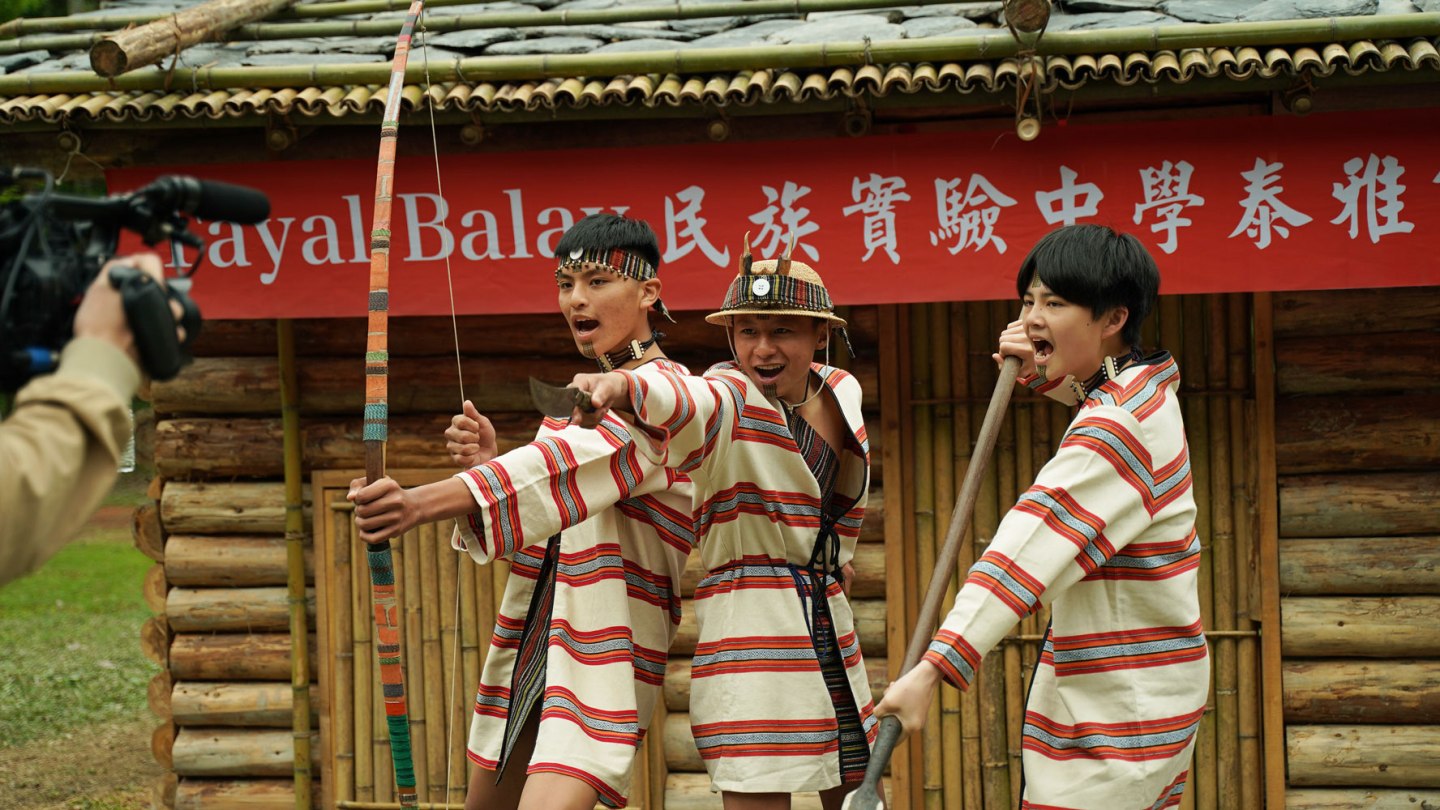
“Children will find their own way” a grandmother reassures while her community fractures all around her in Laha Mebow’s lighthearted drama, Gaga (哈勇家). “Gaga” refers to the traditional rules of the Atayal people which find themselves under increasing pressure from the wider society. While one granddaughter returns after living abroad in New Zealand and is caught between her affection for her family and her desires for her future, her cousin is devotes himself to his culture but may end up marooned amid encroaching modernity.
As the film opens, Enoch is hiking with his grandfather Hayung on the mountain where he tells him that he used to come to catch fish in his youth but not anymore. Back then, he explains, it was considered important not to transgress on another’s turf. If someone had set fish traps already, you’d be expected to move yours somewhere else. But it doesn’t work that way anymore, as the family discover on entering a dispute with a neighbour who’s engaged a surveyor to essentially annex a third of their land. Father Pasang appeals to the mayor, but is given short shrift and reminded that making an offering is no longer sufficient to mark a boundary. This crisis informs Pasang’s fateful decision to stand for mayor himself which places increasing strain on family relations especially in the wake of Hayung’s death.
With Hayung gone, there is a sense that the traditional practices of the Atayal people are being lost. His grandson, Enoch, has a Christian name but is close to his grandfather and seems to be devoted to preserving their culture, often seen playing his mouth harp, singing traditional songs and dancing. His cousin Ali, meanwhile, has been studying abroad in New Zealand and seems increasingly at odds with the traditional ways of the village not least when it is discovered that she’s become pregnant out of wedlock with her overseas boyfriend who is also of an Asian background but is unable to speak Mandarin let alone the Atayal language. Ali isn’t sure she wants to keep the baby, but abortion is against Gaga while her father is chiefly worried about his electoral prospects amid a scandal concerning his only daughter.
Pasang’s response hints at the inherent corruption in the electoral system. Resolving to neutralise a scandal before it takes hold, he decides to slaughter 10 pigs as a sacrifice and give the meat to other villagers, holding what is staged as a wedding reception for Ali and her oblivious boyfriend Andy who suddenly arrives for a surprise visit. Local politics is essentially transactional, villagers are accustomed to voting for whoever gives them the most stuff rather than whoever offers them the best prospects for their future perhaps cynically deciding to take what they can get having little faith that those in power are really going to have their best interests at heart. Pasang plays the game, but the game costs money endangering not only his own financial security but that of his family and most particularly his younger brother Silan whose land was at issue in the first place. Pressured by his mother, Silan is emotionally blackmailed into “helping” his brother with the promise that he will pay him back when he wins which he must do or else they are all ruined. But Pasang soon discovers that taking power over one’s life is not so easy, because those who already have power will be forgiven for breaking the rules while those who do not will not.
On some level, Pasang is still expecting Ali to stay in the village and Andy to move there to be with her, while Andy, a little older than Ali, is seemingly unfazed by the prospect of youthful fatherhood but wants to take his family home to New Zealand. Communication issues are only part of the problem, the indigenous community switching between their own language, Mandarin, and Taiwanese Hokkien while adding English into the mix but eventually discovering that in the end they don’t need really words to communicate with Andy but are satisfied that he loves their daughter while the choice should be hers alone. Ali meanwhile is beginning to feel railroaded, as if everyone is trying to make her choices for her. Grandma has already named the baby after Hayung seemingly assuming that she will raise it to be an Atayal adult in the village.
In parallel, Enoch’s sister Agnes is forced to enlist in the military in order to support the family following their financial ruin each of them accepting that Enoch is not suited to life outside the village and can do nothing other than continue their traditional way of life. But then again, it’s also clear that as an alternative revenue stream the villagers are forced to parade their culture as entertainment for tourists. Pasang even strikes a funding deal agreeing to host a temple on his land where tourists can stay, while attempts to construct a “traditional” Atayal house in the central square to provide cultural education are co-opted by builders from the city who ignore all of Hayung’s advice about how to build. Part of the roof collapses during the opening ceremony. Enoch asks why some of the children are excited about the “real” New Year which they think of as the Spring Festival pointing out that the Atayal celebration takes place after the harvest, Christmas is for Westerners and Dec. 31 the Japanese. In the end it’s up to him alone to stoke the fires of his culture amid an uncertain modernity.
Gaga screens at USCD Price Center Theater Nov. 6 and Ultrastar Mission Valley on Nov. 7 as part of this year’s San Diego Asian Film Festival.
Original trailer (English subtitles)
